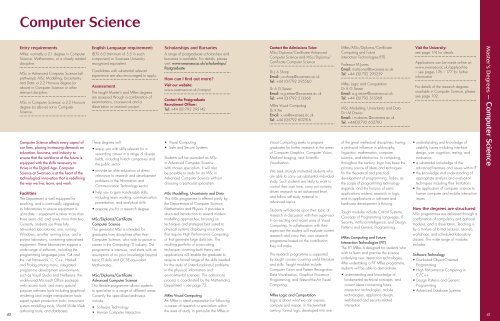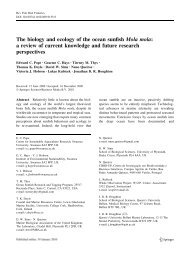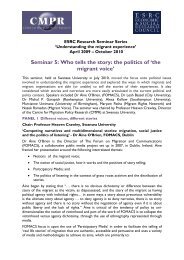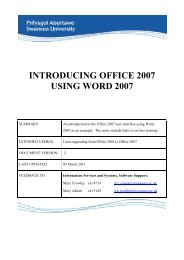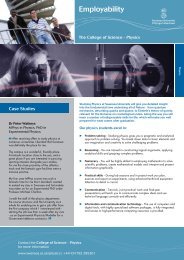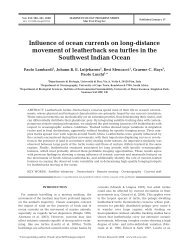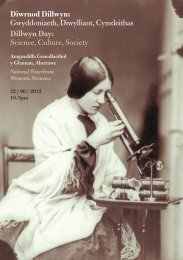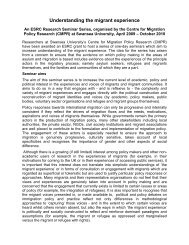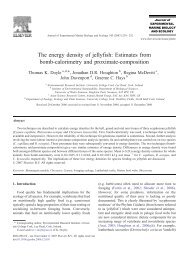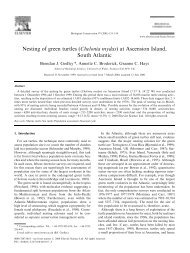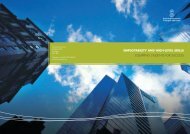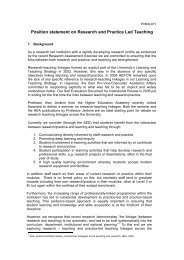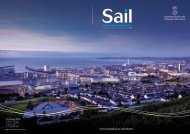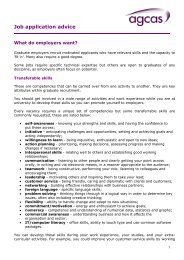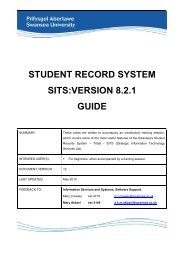Postgraduate Prospectus 2013 - Swansea University
Postgraduate Prospectus 2013 - Swansea University
Postgraduate Prospectus 2013 - Swansea University
Create successful ePaper yourself
Turn your PDF publications into a flip-book with our unique Google optimized e-Paper software.
Computer Science<br />
40<br />
Entry requirements<br />
MRes: normally a 2.1 degree in Computer<br />
Science, Mathematics, or a closely related<br />
discipline.<br />
MSc in Advanced Computer Science (all<br />
pathways); MSc Modelling, Uncertainty<br />
and Data: a 2.2 Honours degree (or<br />
above) in Computer Science or other<br />
relevant discipline.<br />
MSc in Computer Science: a 2.2 Honours<br />
degree (or above) not in Computer<br />
Science.<br />
Computer Science affects every aspect of<br />
our lives, placing increasing demands on<br />
education, business, and industry to<br />
ensure that the workforce of the future is<br />
equipped with the skills necessary to<br />
thrive in the Digital Age. Computer<br />
Science at <strong>Swansea</strong> is at the heart of the<br />
technological innovation that is redefining<br />
the way we live, learn, and work.<br />
Facilities<br />
The Department is well equipped for<br />
teaching, and is continually upgrading<br />
its laboratories to ensure equipment is<br />
up-to-date – equipment is never more than<br />
three years old, and rarely more than two.<br />
Currently, students use three fully<br />
networked laboratories: one, running<br />
Windows; another running Linux; and a<br />
project laboratory, containing specialised<br />
equipment. These laboratories support a<br />
wide range of software, including the<br />
programming languages Java, C# and<br />
the .net framework, C, C++, Haskell<br />
and Prolog among many; integrated<br />
programme development environments<br />
such as Visual Studio and Netbeans; the<br />
widely-used Microsoft Office package;<br />
web access tools; and many special<br />
purpose software tools including graphical<br />
rendering and image manipulation tools;<br />
expert system production tools; concurrent<br />
system modelling tools; World Wide Web<br />
authoring tools; and databases.<br />
English Language requirement:<br />
IELTS 6.0 (minimum of 5.5 in each<br />
component) or <strong>Swansea</strong> <strong>University</strong><br />
recognised equivalent.<br />
Candidates with substantial relevant<br />
experience are also encouraged to apply.<br />
Assessment<br />
The taught Master’s and MRes degrees<br />
are assessed through a combination of<br />
examinations, coursework and a<br />
dissertation or research project.<br />
These degrees will:<br />
• equip you with skills relevant for a<br />
rewarding career in a range of diverse<br />
fields, including hi-tech companies and<br />
the public sector<br />
• provide an elite education of direct<br />
relevance to research and development<br />
problems in the Information and<br />
Communication Technology sector<br />
• help you to gain transferable skills,<br />
including team working, communication,<br />
presentation, and analytical skills<br />
• prepare you for a research degree<br />
MSc/Diploma/Certificate<br />
Computer Science<br />
This generalist MSc is intended for<br />
graduates from disciplines other than<br />
Computer Science, who wish to pursue a<br />
career in the Computing/IT industry. The<br />
programme is intensive, and starts with an<br />
assumption of no prior knowledge beyond<br />
basic IT skills and GCSE-equivalent<br />
Mathematics.<br />
MSc/Diploma/Certificate<br />
Advanced Computer Science<br />
This flexible programme allows students<br />
to specialise in a range of different areas.<br />
Currently the specialised pathways<br />
include:<br />
• Software Technology<br />
• Human Computer Interaction<br />
Scholarships and Bursaries<br />
A range of postgraduate scholarships and<br />
bursaries is available. For details, please<br />
visit: www.swansea.ac.uk/scholarships/<br />
<strong>Postgraduate</strong><br />
How can I find out more?<br />
Visit our website:<br />
www.swansea.ac.uk/compsci<br />
Contact the <strong>Postgraduate</strong><br />
Recruitment Officer:<br />
Tel: +44 (0)1792 295142<br />
• Visual Computing<br />
• Safe and Secure Systems<br />
Students will be awarded an MSc<br />
in Advanced Computer Science<br />
with chosen specialism. It will also<br />
be possible to study for an MSc in<br />
Advanced Computer Science without<br />
choosing a particular specialism.<br />
MSc Modelling, Uncertainty and Data<br />
This MSc programme is offered jointly by<br />
the Departments of Computer Science,<br />
Mathematics and Physics. It provides a<br />
structured introduction to several modern<br />
modelling approaches, focusing on<br />
techniques and strategies best suited to<br />
physical systems displaying uncertainty,<br />
that require High Performance Computing,<br />
or that generate large data sets. The<br />
resulting portfolio of cross-cutting<br />
techniques covering both theory and<br />
applications will enable the graduate to<br />
acquire a broad range of the skills needed<br />
for the study of (interdisciplinary) problems<br />
in the physical, information and<br />
environmental sciences. The admissions<br />
process is coordinated by the Mathematics<br />
Department – see page 72.<br />
MRes Visual Computing<br />
An MRes is ideal preparation for following<br />
a career of research or specialism within<br />
the area of study. In particular the MRes in<br />
Contact the Admissions Tutor:<br />
MSc/Diploma/Certificate Advanced<br />
Computer Science and MSc/Diploma/<br />
Certificate Computer Science<br />
Dr J A Sharp<br />
Email: j.a.sharp@swansea.ac.uk<br />
Tel: +44 (0)1792 295560<br />
Dr A G Setzer<br />
Email: a.g.setzer@swansea.ac.uk<br />
Tel: +44 (0)1792 513368<br />
MRes Visual Computing<br />
Dr X Xie<br />
Email: x.xie@swansea.ac.uk<br />
Tel: +44 (0)1792 602916<br />
Visual Computing seeks to prepare<br />
graduates for further research in the areas<br />
of Computer Graphics, Computer Vision,<br />
Medical Imaging, and Scientific<br />
Visualisation.<br />
We seek strongly motivated students who<br />
are able to carry out substantial individual<br />
study. Such students are likely to want to<br />
control their own time, carry out curiosity<br />
driven research to an advanced level,<br />
and follow self-study material in<br />
advanced topics.<br />
Students will decide upon their topic of<br />
research in discussion with their supervisor<br />
in an exciting and recent area of Visual<br />
Computing. In collaboration with their<br />
supervisor the student will evaluate current<br />
research and carry their own research<br />
programme based on the contribution<br />
they will make.<br />
The research programme is supported<br />
by taught courses covering useful literature<br />
and skills. Taught modules include<br />
Computer Vision and Pattern Recognition,<br />
Data Visualisation, Graphics Processor<br />
Programming, and State-of-the-Art Visual<br />
Computing.<br />
MRes Logic and Computation<br />
Logic is about what we can express,<br />
compute and reason. In the twentieth<br />
century, formal logic developed into one<br />
MRes/MSc/Diploma/Certificate<br />
Computing and Future<br />
Interaction Technologies (FIT)<br />
Professor M Jones<br />
Email: matt.jones@swansea.ac.uk<br />
Tel: +44 (0)1792 295259<br />
MRes Logic and Computation<br />
Dr A G Setzer<br />
Email: a.g.setzer@swansea.ac.uk<br />
Tel: +44 (0)1792 513368<br />
MSc Modelling, Uncertainty and Data<br />
Dr I M Davies<br />
Email: i.m.davies @swansea.ac.uk<br />
Tel: +44(0)1792 602760<br />
of the great intellectual disciplines, having<br />
a profound influence in philosophy,<br />
linguistics, mathematics, computer<br />
science, and electronics. In computing,<br />
throughout the century, logic has been the<br />
primary source of ideas and techniques<br />
for the theoretical and practical<br />
development of programming. Today, as<br />
the scope of programming technology<br />
expands, and the horizon of users’<br />
applications widens, research in logic<br />
and its applications in software and<br />
hardware development is thriving.<br />
Taught modules include Critical Systems,<br />
Concepts of Programming Languages, IT<br />
Security, Artificial Intelligence, and Design<br />
Patterns and Generic Programming.<br />
MRes Computing and Future<br />
Interaction Technologies (FIT)<br />
The FIT MRes is designed for students who<br />
wish to learn and practise the science<br />
underlying new interaction technologies.<br />
After undertaking a FIT MRes programme,<br />
students will be able to demonstrate:<br />
• understanding and knowledge of<br />
fundamental technical concepts, and<br />
current ideas concerning future<br />
interaction technologies, mobile<br />
technologies, appliance design,<br />
web-based and security-related<br />
interaction<br />
Visit the <strong>University</strong>:<br />
see page 174 for details<br />
Applications can be made online at:<br />
www.swansea.ac.uk/applyonline<br />
– see pages 176 – 177 for further<br />
information<br />
For details of the research degrees<br />
available in Computer Science, please<br />
see page 102.<br />
• understanding and knowledge of<br />
usability issues including interface<br />
design, user cognition, testing, and<br />
evaluation<br />
• a substantial knowledge of the<br />
advanced literature and issues within IT<br />
• the knowledge and understanding of<br />
appropriate analysis and evaluation<br />
techniques including their limitations<br />
• the application of computer science to<br />
human computer and mobile interaction<br />
issues<br />
How the degrees are structured<br />
MSc programmes are delivered through a<br />
combination of compulsory and optional<br />
modules, and a dissertation. Teaching is<br />
by a mixture of formal lectures, tutorials,<br />
workshops, and scheduled laboratory<br />
classes. The wide range of modules<br />
includes:<br />
Software Technology<br />
• Distributed Object-Oriented<br />
Programming<br />
• High Performance Computing in<br />
C/C++<br />
• Design Patterns and Generic<br />
Programming<br />
• Advanced Database Systems<br />
Master’s Degrees – Computer Science<br />
41


